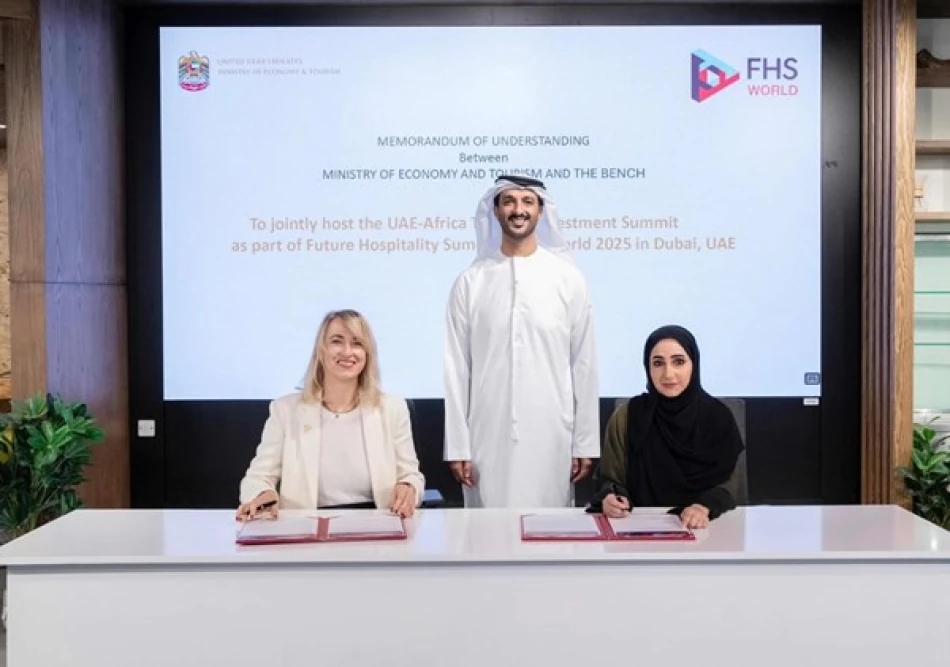
UAE Hosts Africa Investment Summit: Unlocking Tourism Opportunities
UAE Positions Itself as Gateway to Africa's $200 Billion Tourism Market
The UAE is making a strategic play for Africa's rapidly expanding tourism sector, announcing the inaugural "UAE-Africa Tourism Investment Summit" for October 27, 2025, in Dubai. This move positions the Emirates as the primary investment conduit between global capital and Africa's hospitality market, which represents one of the world's fastest-growing tourism regions with over 250 high-level decision-makers from all 53 African nations expected to attend.
Strategic Timing Meets Market Opportunity
The summit, hosted within the broader "Future Hospitality Summit - FHS World 2025," comes at a pivotal moment for African tourism. The continent's travel and tourism sector contributed approximately $169 billion to GDP in 2019 and is projected to reach $261 billion by 2030, according to industry forecasts. However, infrastructure gaps and financing challenges have historically limited growth potential.
The UAE's Ministry of Economy and Tourism has formalized this initiative through a memorandum of understanding with The Bench, the global events company organizing FHS World 2025. The agreement was signed by Badria Al Maidoor, Assistant Undersecretary for Supporting Services Sector at the ministry, and Daria Smith, Portfolio Director of Events at The Bench.
Beyond Traditional Investment Patterns
Unlike previous investment approaches that focused primarily on extractive industries, this summit emphasizes sustainable tourism development and hospitality infrastructure. This shift reflects broader economic diversification strategies across both regions, with the UAE leveraging its position as a global financial hub while African nations seek to monetize their vast cultural and natural tourism assets.
Competitive Positioning Against Regional Rivals
The UAE's move mirrors similar strategies employed by Singapore and Hong Kong in Asian markets, where these city-states established themselves as essential intermediaries between Western capital and emerging Asian economies. However, the UAE faces competition from other Gulf states, particularly Saudi Arabia, which has announced massive tourism investments through its Vision 2030 program.
The timing also coincides with increased Chinese investment in African infrastructure through the Belt and Road Initiative, potentially creating competition for influence in the continent's hospitality sector development.
Market Implications for Investors
For international hospitality investors, this summit represents access to markets that have been challenging to navigate independently. African tourism markets often require local partnerships and regulatory navigation that UAE-based intermediaries can facilitate. The presence of tourism ministers and investment promotion authority representatives from all 53 African nations suggests serious governmental backing for potential deals.
Alignment with UAE's Economic Vision
Al Maidoor emphasized that the summit aligns with the "We the UAE 2031" vision, which aims to establish the country as a leading global hub for the new competitive economy. This positioning leverages the UAE's existing strengths in aviation connectivity, financial services, and regulatory stability.
Jonathan Worsley, Chairman of The Bench, highlighted the UAE's "pivotal role in connecting global capital with emerging markets," a function that has become increasingly valuable as traditional investment routes face geopolitical complications.
Infrastructure Development Focus
The summit will explore partnerships across tourism, investment, infrastructure, and hospitality sectors. This comprehensive approach suggests recognition that African tourism development requires integrated solutions rather than isolated hotel developments. Infrastructure challenges, from airport capacity to digital payment systems, have historically limited Africa's tourism potential despite the continent's natural advantages.
Long-term Strategic Implications
This initiative represents more than a single event; it signals the UAE's intention to become the primary financial and logistical gateway for African tourism development. Success could establish Dubai as the de facto headquarters for African hospitality investment, similar to its current role in Middle Eastern and South Asian markets.
The summit's focus on sustainable development also addresses growing investor concerns about environmental, social, and governance (ESG) factors in emerging market investments. As global tourism increasingly emphasizes sustainability, early movers in responsible African tourism development could capture significant market advantages.
With global tourism recovering from pandemic impacts and seeking new growth markets, the UAE-Africa tourism summit could catalyze a significant shift in investment flows toward the continent's hospitality sector, potentially unlocking billions in previously inaccessible market opportunities.
Most Viewed News

 Layla Al Mansoori
Layla Al Mansoori






